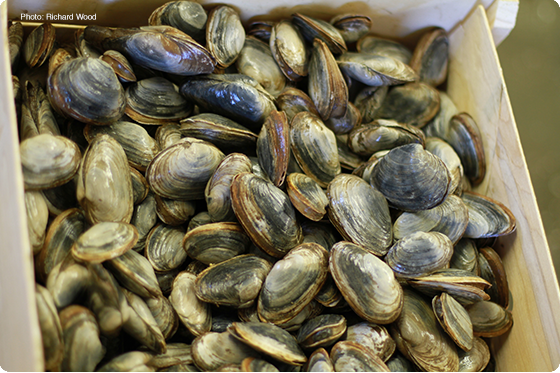
On June 21, North Carolina’s governor signed a bill into law that makes several critical changes to the state’s shellfish aquaculture leasing program. The bill—S.B. 648—was unanimously passed by the state’s Senate in early May, with the House doing the same on June 12. The final text of the bill was refined in a yearlong stakeholder process, and is drawn in part from a strategic plan for shellfish mariculture that was developed last year by the University of North Carolina Chapel Hill’s North Carolina Policy Collaboratory.
Perhaps most notably, the law authorizes the state’s Division of Marine Fisheries to establish one or more Shellfish Aquaculture Enterprise Areas for both bottom and water column leases as well as a related permitting and leasing process. The Enterprise Areas are meant to provide a faster, more streamlined permitting process for shellfish aquaculturists while also reducing the number of potential user conflicts and lease-related lawsuits. The Enterprise Areas will likely be 20 – 40-acre areas that will be subdivided into smaller parcels upon which aquaculturists can begin to culture shellfish after successfully completing an application process. The exact location and of the areas will be determined with public input gathered from local stakeholders in public meetings. In contrast to North Carolina’s current leasing system for shellfish aquaculture, the Enterprise Area structure would revert leases to the state once the leaseholder stops operations instead of being traded or passed onto heirs like property. State officials hope that imposition of the new system will foster a more a more efficient and less contentious permitting process for regulators that is necessary to keep up with a growing demand for leases.
In addition to the creation of Shellfish Aquaculture Enterprise Areas, the law somewhat controversially increases production requirements for all shellfish aquaculture leases. This change has drawn criticism from some aquaculturists who feel the language may attract larger aquaculture companies to the state while discouraging the continued establishment of smaller farms. Conversely, proponents of the law’s language argue that it is necessary to make sure state waters are being used to their full potential in order to best benefit the state’s economy as a whole.
The law also makes provisions for the transition of terminated shellfish aquaculture leases to productive uses. Upon termination of any lease, the state can now either: 1) make the bottom available for a new lease application for 18 months, 2) designate the bottom a Shellfish Aquaculture Enterprise Area, or 3) make the bottom open for public use. The state can also grant shellfish cultivation leases to North Carolina residents when it determines such a lease will benefit the public interest if the lease area is both suitable for commercial cultivation and harvesting and does not contain a natural shellfish bed.
Other changes in the law relate to: 1) the establishment of a shellfish aquaculture pilot program in the state’s Pamlico Sound, 2) the transportation of seed oysters and seed clams from permitted nursery facilities in prohibited waters, 3) administrative remedies for shellfish leasing appeals, 4) moratoriums on shellfish leasing in the state’s New Hanover County area as well as Bogue Sound, 5) the reduction of user conflicts related to shellfish cultivation leases, 6) penalties associated with illegal shellfish and shellfish operation takings, 7) shellfish loan programs, and 8) crop insurance for shellfish aquaculture.
Many in the state hope that the new law will bring to fruition long-term efforts aimed at expanding shellfish aquaculture leasing in state waters while simultaneously reducing conflict between non-aquacultural users of public trust waters as well as other aquaculturists. While the bill contains wins and losses for state shellfish aquaculturists in many critics’ views, most agree that it is a step in the right direction for North Carolina that could potentially help grow a more lucrative and robust shellfish aquaculture industry within the state. Click here for the full text of the new law.













